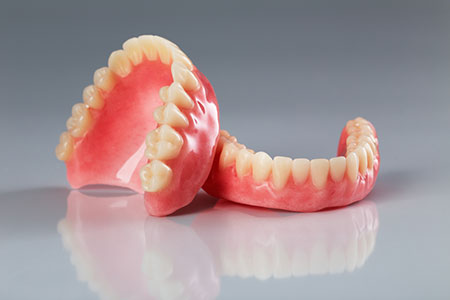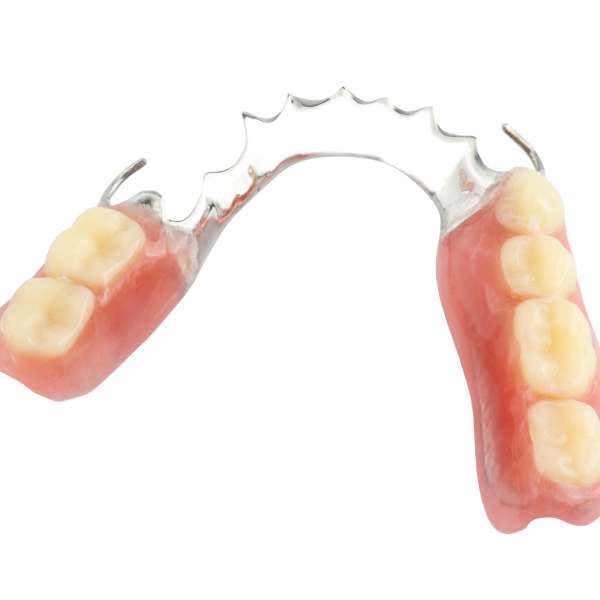What Is a Denture?
A denture is a removable prosthesis used to replace missing teeth.
Commonly referred to as “false teeth”, it is usually made of acrylic (hard plastic material) or a combination of acrylic and metal.
A partial denture is fitted to replace some missing teeth whilst a complete denture is indicated when all natural teeth are missing.
Why Should You Make a Denture?


Replacing missing teeth will help to improve your appearance and smile better thus uplifting your confidence and self-esteem.
Without support from the denture, facial muscles sag, making a person look older.
Dentures can help you eat and speak more comfortably.
How Long does a Denture Take to Make?


After the initial visit of examination and diagnosis, the subsequent visits will include taking impressions or moulds of the mouth, checking of the bite, try-in and issue of the denture.
Types of Dentures
There are three types of material you can choose for your dentures.
- Acrylic (Plastic)
- Cobalt Chrome (Combination of plastic and metal)
- Flexible – flexible denture is made of a flexible material that allows the denture to adapt to the constant movement and bending in the mouth during function without breakage.
How Long does a Denture Last?
The denture in your mouth can be used for a few years as it do wear and tear with usage. The plastic teeth do get worn down and the metal hooks may loosen with use. The fitting surface of the denture against the jaw may not fit as well as before when the jaw bone continues to shrink under the pressure and with age.
Over a period of time, your denture will need reassess to see if you need a new denture or sometime, certain procedures can be done to improve or repair the old denture. As you age, your mouth naturally changes. These changes cause your dentures to loosen, making chewing difficult and irritating your gums.
You should see your dentist every 6 months for a check-up to assess the condition of your denture and natural teeth.
Is the Procedure For Making Dentures Painful?
The process of making dentures is not painful at all. However, new dentures always feel strange when first placed in the mouth. Several days or weeks will be required before you get accustomed to them.
Adaptation varies with different people and often, time and experience are essential before dentures can be worn comfortably and function effectively.
FAQs
Can I start making denture immediately after I extracted my tooth/teeth?
You are advised to wait 1-2 months of healing time after extraction before beginning the procedure of making dentures. This healing time allows for the “hole” in your jaw to heal and change shape after the extraction. Longer healing time means that you will have a better fit on your dentures when we make the mould (impression) of the jaw.
However not everyone can wait for 1-2 months walking around with missing front teeth. In such cases when esthetics is of priority, the process can be sped up to shorten this embarrassing period of being toothless. The denture can be made in advance before the tooth is extracted so that you do not need to worry about missing front teeth on the day of extraction. Please discuss your need with our dentists and they will advise you on the proper treatment plan that is suitable for your clinical situation.
What can I do to fix my loose dentures?
Adhesives will generally prevent food from getting underneath your denture, but do not offer a long term solution. In order to fix your loose denture, the denture must be relined or replaced. If the denture teeth are not worn down too much, a denture reline can offer a quick solution. If the teeth on your denture are worn down, a replacement denture is highly recommended to restore your proper bite and chewing function.
How do I get used to wearing dentures?
Eating – Eating will take a little practice. Start with soft foods and foods cut into small pieces will help. Chew slowly using both sides of the mouth simultaneously to prevent dentures from tipping. Once you become accustomed to chewing, include other foods until you return to your normal diet.
Increased salivary flow – You may experience an increase in salivary flow when the dentures are first inserted. This is a natural response of the salivary glands which will return to normal after a few weeks. You can improve the situation by swallowing more often.
Speech – New dentures may alter your speech initially. Pronouncing certain words may require practice. Reading out loud and repeating troublesome words will speed up the adaptation process. This problem rarely persists beyond two weeks.
Sore spots – Minor irritation caused by surface irregularities or pressure spots on the denture-bearing areas are quite common. Your dentist will relieve the discomfort by adjusting the denture surface. Stop wearing the denture if great pain develops. Consult your dentist immediately.
What food should I avoid eating with dentures?
- Sticky foods. Sticky substances can move your dentures out of place, allowing food to get underneath the dentures and irritate your gums. Examples include peanut butter and gummy candies.
- Foods with small but stubborn pieces. Any food with pieces your natural teeth cannot grind or chew easily present problems for dentures. Popcorn kernels, sesame seeds on rolls, and shelled nuts or seeds can get stuck in and around dentures.
- Hard foods. Hard foods require your jaw and your dentures to apply uneven pressure. This can damage or dislodge dentures. Stay away from nuts, popcorn, apples, carrot sticks, and corn on the cob, except as an occasional treat.
- Tough meats. Foods that require many bites to tenderize them place unnecessary stress on dentures and gums. Too much chewing and grinding creates sore spots where dentures and gums meet. Avoid pork chops, steak, and ribs to prevent sores from developing.
How do I take care of my dentures?
- Like natural teeth, dentures can accumulate plaque and food debris, particularly in those areas where the denture is in contact with the remaining teeth and gum. In addition to the usual oral hygiene measures like tooth brushing, dentures should be cleaned regularly. Poor denture hygiene results in stains on the denture and a bad odour.If possible, dentures should be removed and cleaned after every meal. When cleaning, remember the following:Use a soft handbrush or a special denture brush
Avoid very hot water as it may distort the denture
Use mild detergent to clean. Avoid using abrasive cleaners that can roughen the polished surface of the denture. Do not use bleach as this may whiten the pink acrylic
Hold the denture firmly while cleaning. Accidental droppage may result in chipped or broken dentures. Always wash your denture over a basin of water
Soak the dentures in denture cleanser once a week to remove stains and always rinse them thoroughly before using the dentures again. When you are not wearing the dentures, store them in water. Dentures may lose their shape if left to dry out.
How long can dentures last?
Dentures will, eventually, need to be replaced, but with the proper care, they can last several years. In general, dentists recommend getting new dentures every five to eight years. Over this time, dentures get worn out due to regular use, and your gums may change shape or shrink over the years. If you clean and care for your dentures properly, you won’t have to worry about getting new dentures for at least several years.
Will people notice that I am wearing dentures?
Modern dentures are both comfortable and natural looking and will improve your appearance. You will find that people will comment upon your smile and facial appearance which is always a bonus.
Will dentures affect my speech, chewing and other function?
You may find that some words are more difficult to speak than others. The best way of dealing with this is to repeat these words until you become used to speaking them. Practise speaking till you are comfortable with the denture in place.
The denture cannot exert the same biting force as natural teeth. The strength of the biting force of denture wearer ranges from 1/5 to 1/4 that of natural teeth and it is enough to chew vegetables and meat but at a slower pace. If you want to chew like your natural teeth, then dental implant is the only way to restore such biting function.
If you find that your dentures tend to slip when you smile or cough then bite down on the denture and swallow. This will help to fix it in place. If this problem persists then consult your dentist.
What is the alternative to dentures?
Dentures are a very popular form of replacement teeth as countless patients will testify to. But, there are some people who find them awkward or uncomfortable. In these cases, dental implants may be the answer.
Implants can be used to replace a single, several or all your teeth and are very effective. But, they do cost more than dentures and involve some form of surgery. Discuss with our dentists if you are a suitable candidate for dental implants.
Bridges can also be used to replaced single or multiple missing teeth. If the adjacent teeth to the missing tooth or teeth needs crowns, then it may be suitable for a bridge. Discuss with our dentists if bridge is suitable for you.

